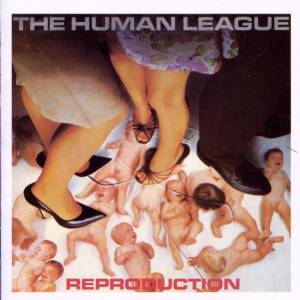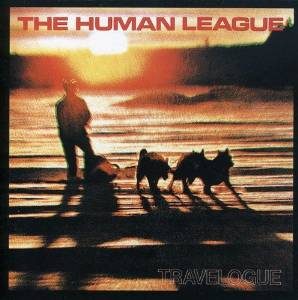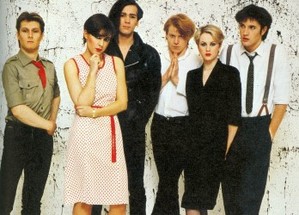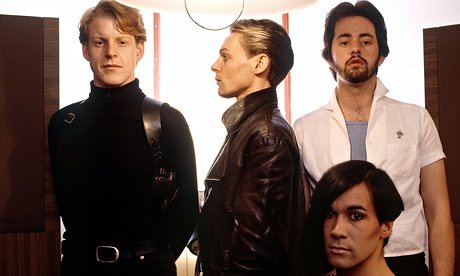Reproduction and Travelogue, the first two records by The Human League were reissued on vinyl last week. If you believe all those best albums ever lists, Dare is the only record of theirs worthy to be included. Whilst, I’d never dispute the genius of Dare, these two records are just as vital.
Reproduction and Travelogue are full of bizarre storytelling and oblique imagery. They effortlessly fused off-kilter pop melodies with their avant garde leanings. The way they wrote about the human condition was so unique with Oakey’s deadpan delivery selling the strange subject matters on every song. There’s not many groups who could pull off a song that opens with the lines, “a crow and a baby had an affair, the result was a landslide, the result was a dare”. They showed their sense of humour, but at their darkest, they were the electronic version of Joy Division.


Founding members, Phil Oakey, Ian Craig Marsh and Martyn Ware famously wrote a manifesto when they formed in 1977. They wrote how the group would “base their compositions on logic, inspiration and luck as they had no orthodox musical training”. There was obviously a tongue in cheek element to this, but there is some truth in their lack of musical training and how they used it. There was a punk spirit to their unprofessional approach even though musically there weren’t similarities (guitars weren’t allowed). Oakey’s androgynous image was subversive in the same way punk and glam rock had been before. They were three arty guys from Sheffield who created uncompromising music that fit the industrial surroundings of the city. Their shared love of glam rock, Kraftwerk, Donna Summer, Clockwork Orange and anything related to science fiction helped influence two compelling electronic records that still sound spontaneous and leftfield today.
After Ware and Marsh left to form the sometimes brilliant Heaven 17, Oakey regrouped and went on to pursue a different and bigger pop vision despite being written off by critics and their record company. The story of how he recruited Joanne Catherall and Susan Ann Sulley in a nightclub is the most famous part of The Human League timeline. The influence of Ian Burden and Jo Callis who came onboard for this era shouldn’t be forgotten either. Philip Adrian Wright was also a key part to their success when he stepped up from slide operator at their live shows to play keyboards. They have continued to release albums sporadically and maintain their reputation as a successful touring band. They’ve had varied success commercially and with quality, but at their best they’re one of the most original and exciting synthpop groups. Not bad going for a band that based their compositions on luck.

Here are 11 of their best songs from all incarnations of the group that tell their story.
Circus of Death (Fast Version) (1978)
The conclusion of their manifesto read, “the League would like to positively affect the future by close attention to the present, allying technology with humanity and humour” which was inline with their wonderfully bleak and influential first single, ‘Being Boiled’. Its B-side, ‘Circus of Death’ was even darker and more ominous, coming across as a soundtrack to the creepiest episode of Dr Who ever. Oakey’s detached vocals are suited to the unnerving cold synths that create a sense of dread fitting for the song’s title. ‘Circus of Death’ features the first of Oakey’s trademark spoken interludes, “the drug which gives the clown power means the circus can never be stopped and his dream can go on unhindered ’till the last human being has dropped”. The sound of the “oohs” and “ah’s” from the audience brings their humour out.
Empire State Human (1979)
It took a few years for the record buying public to catch up with The Human League’s unique pop vision. OMD, Gary Numan and Ultravox all beat them to the top 10 in that time. Despite their uncompromising sound, the band still wanted success. ‘Empire State Human’ was their first big pop moment. Over a rolling bassline and sparkling synths Oakey sings of a need to be bigger in size. The determination in which he sings the addictive chorus, “tall, tall, tall, I want to be tall, tall, tall as big as a wall, wall, wall” is totally convincing. The explosion of synths as the child-like backing vocals carry the rest of the song are captivating. ‘Empire State Human’ reached 62 when reissued in 1980, but it should have been as big as ‘Don’t You Want Me’.
The Black Hit of Space (1980)
Travelogue begins with one of the most dense and thrilling songs from the synthpop era. After a minimal intro with a slow clapping beat a huge wave of industrial synths and bass comes crashing in. When Oakey sings, “the futuristic sound wobbles off and on” he describes the atmospherics of the song perfectly. He tells a story of a song that becomes so big that it devours every other record and eventually the world. The music is so big and overwrought that it captures the essence of the song he’s imagining. It’s impressive that Oakey could deliver a lyric as ridiculous as, “the needle was one micron long and weighed more than Saturn” with complete conviction.
WXJL Tonight (1980)
The impact of the massive wall of sound that opens ‘WXJL Tonight’ means Travelogue ends as powerfully as it begins. It’s one of many of their early songs that could work as a soundtrack for a space themed computer game. ‘WXJL Tonight’ is the sound of a band that were reaching beyond the limits of 70s technology and production. There are layers of deep synths that contrast with an arresting beat that sound way ahead of their time. Oakey gives one of his best vocals as he sings, “our music beats the best, you just don’t need the rest” at the climax. It works as an apt closer to this chapter of their career.
The Things That Dreams Are Made of (1981)
The sheen of Dare’s simple artwork was a good match for the new streamlined Human League who quickly mastered turning pure sonic thrills into perfect pop songs. ‘The Things That Dreams Are Made of’ is about the joys of life. Oakey appears wiser and more mature as he advises, “everybody needs cash to spend, everybody needs love and affection, everybody needs two or three friends”. The use stabbing and then sliding synths build to a euphoric chorus. There are tight rhythms and warmth that weren’t as obvious on their earlier work. The addition of Sulley and Catherall provided a human touch that was missing too.
You Remind Me of Gold (1982)
After the massive success of Dare, the group released two wonderful singles produced by Martin Rushent who helped make Dare a remarkable record. ‘Mirror Man’ was their take on Motown and ‘(Keep Feeling) Fascination’ took an ugly synth line and turned it into one of their catchiest songs. ‘Mirror Man’ came backed by the eerie,‘You Remind Me of Gold’. The mix of shimmering robotic keyboards, funky bassline and siren-like hook are unexpected but blend together in glorious way. The charm of Sulley and Catherall repeating the chorus shows their skill at making such an unconventional song sound so memorable.
I Love You Too Much (Original Version) (1983)
In 1983 Virgin collected the songs recorded with Rushent for the fourth Human League record on a mini album called Fascination for the American market. ‘I Love You Too Much’ is the great lost Human League single. A year later they re-recorded an inferior version for Hysteria. The group had flirted with disco on their single ‘I Don’t Depend on You’ released as The Men. Here they get even closer to their ABBA meets Chic aspirations (especially with that ‘Good Times’ aping bassline). Sulley and Catherall shine with some of their most infectious vocals that help create one of their best choruses. This should have followed ‘Fascination’ into the top three.
Life on Your Own (1984)
After Rushent quit recording sessions for their fourth record they carried on and released the underwhelming Hysteria. Just like fellow Sheffield group ABC, losing the producer that helped make their masterpiece affected the quality of the follow up (Trevor Horn was unable to work on the follow up to The Lexicon of Love). Despite Hysteria’s flaws it still produced three fine singles. ‘The Lebanon’ is much more exciting than its reputation would suggest and ‘Louise’ is a beautiful simplistic love song. ‘Life On Your Own’ hinted at the R&B influence they would further explore on 1986’s Crash and is their most effective take on heartbreak and melancholy.
Heart Like a Wheel (1990)
Teaming up with legendary producers, Jam & Lewis didn’t yield the impressive results it should have for 1986’s Crash (apart from the gorgeous ‘Human’ and the fierce ‘Love Is All That Matters’). The group seemed to lose their identity. 1990’s Romantic? was an improvement as they sounded like themselves again. ‘Heart Like a Wheel’ finds them reunited with Rushent and back in defiant spirit. Over dramatic Moroder styled synths the band confidently sing, “calling out around the world are you ready for a brand new beat…the future is here, and packing some heat”. Sadly the public weren’t ready and their best song since 1983 reached a disappointing number 29.
Housefull of Nothing (1995)
Octopus gave the group their biggest hit single in over a decade with ‘Tell Me When’ and was their most popular album since Dare. These songs were the group finding where they fit in modern music and being comfortable with it, whilst acknowledging their past (similar to how Pet Shop Boys have survived). ‘Housefull of Nothing’ is a highlight with a classic call and response between an impassioned Oakey and the girls in the dark verses leading to one of their most uplifting choruses. The quality and success of Octopus was extremely welcome.
Love Me Madly? (2001)
The Human League’s stock was greater than it had been in years at the start of the 2000s. Richard X sampled ‘Being Boiled‘ and ‘The Things That Dreams Are Made of’ on two top hit singles and artists that were indebted to the group were being pushed in the Electroclash movement. Secrets was easily their best and most confident record since Dare thanks to songs like ‘Love Me Madly?’. Oakey’s urgent delivery steals the show with a bubbling synth line underpinning it. He endearingly sings, “you’re like the woman out of species, I think I’m going to go to pieces” like only he can. A typically brilliant chorus explodes into life and is one of many of the record. Secrets and 2011’s Credo didn’t get the success they deserved, but they’re records that add to their legacy as a group who are always worth rooting for.




